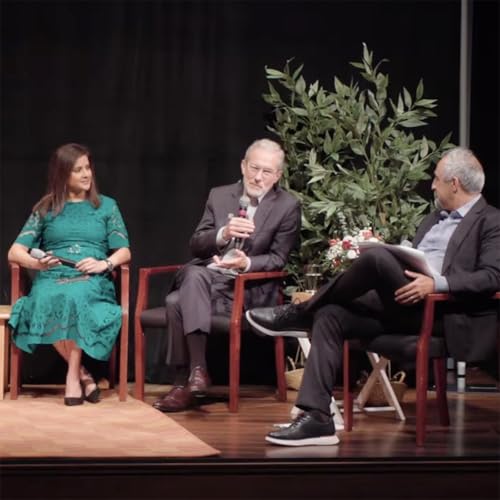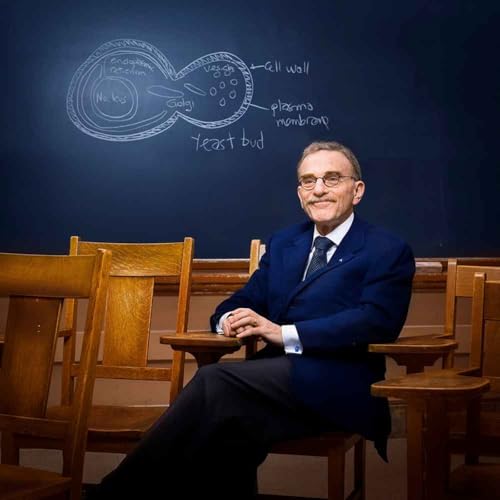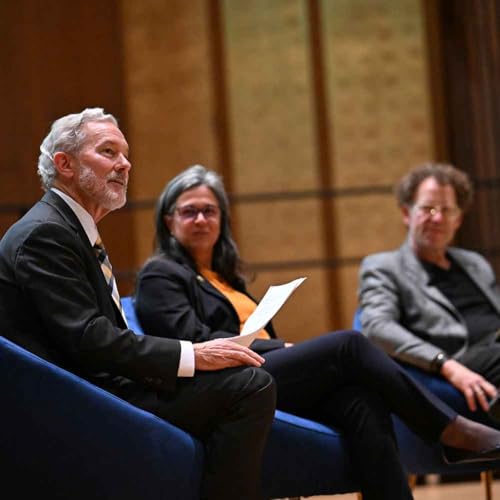In this Berkeley Talks episode, Ramzi Fawaz, a professor of English at the University of Wisconsin–Madison, explores why the humanities and psychedelics might have more in common than you’d think, and how literature, much like psychedelics, can help open one’s mind to the world.
Fawaz, who spoke at UC Berkeley in September, argues that the humanities classroom functions as a vital space for shared sense-making, where deep engagement with art and literature can rewire the brain much like a psychedelic experience — helping students heal from the rigid constraints of competitive individualism.
During the talk, Fawaz recalls reading bestselling author and Berkeley Professor Emeritus Michael Pollan’s How to Change Your Mind.
“I am sort of mind-boggled by the specific chapter where he talks about the neuroscience of psychedelics,” Fawaz tells Ramsey McGlazer, an associate professor in Berkeley’s Department of Comparative Literature, with whom he joined in conversation. “As I was reading it, I was like, ‘He’s just describing humanities education ... except we don’t use drugs, we use art and literature to invoke these transformative effects.’"
Fawaz points out a divide in academia: While scientists look for "magic bullets" to treat mental health — with a specific pill or clinical treatment — humanities scholars often shy away from discussing the intense, emotional ways that art allows us to lose ourselves. He argues that by avoiding these deep sensory experiences, the humanities fail to use their full power to help people heal and grow.
By bridging these fields, he suggests that the study of film and literature can pull us out of our narrow perspectives, enabling us to embrace diversity and multiplicity rather than feel threatened by it.
“This is an extraordinary value of the humanities classroom that we don't talk about,” he says. “It literally has the potential to not only make people critical thinkers, but to actually heal them in a way.”
The event, which took place on Sept. 25, 2025, was organized by the Center for Interdisciplinary Critical Inquiry and co-sponsored by the Berkeley Center for the Science of Psychedelics as part of the Psychedelics in Society and Culture programming.
Fawaz is the author of two books — The New Mutants: Superheroes and the Radical Imagination of American Comics (2016) and Queer Forms (2022) — and is at work on a book titled How to Think Like a Multiverse: Psychedelic Pathways to Embracing a Diverse World. He recently launched his podcast Nerd from the Future, where he engages in conversations with the nation’s leading humanities professors about the state of higher education today.
Listen to the episode and read the transcript on UC Berkeley News (news.berkeley.edu/podcasts/berkeley-talks).
Music by HoliznaCC0.
Photo by Bryce Richter/University of Wisconsin–Madison.
Hosted on Acast. See acast.com/privacy for more information.
 1 hr and 19 mins
1 hr and 19 mins 1 hr and 38 mins
1 hr and 38 mins Dec 26 20251 hr and 5 mins
Dec 26 20251 hr and 5 mins Dec 12 20251 hr and 27 mins
Dec 12 20251 hr and 27 mins 1 hr
1 hr Nov 14 202553 mins
Nov 14 202553 mins 36 mins
36 mins 1 hr and 1 min
1 hr and 1 min
